Marvel’s Luke Cage – A Season One Review
"Harlem's Power Man Shows his Strength as a Marvel Hero in Season One"
WARNING! This review contains several spoilers from the first season of
Marvel's Luke Cage on Netflix. Continue at your own risk!
Like many young men growing up during my generation, I was a comic book fan and had my own particular heroes I would favor and follow. Power Man, also known as Luke Cage, was one of my favorites. With that said, like many I was very excited to learn he would be entering the MCU with his own Netflix series, and eventually team up with other Netflix street-level heroes on
Marvel's Defenders.
Marvel's Luke Cage did not disappoint.
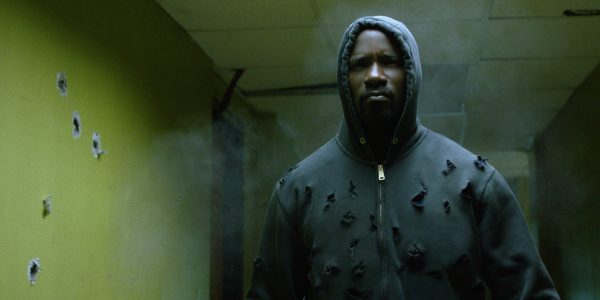
With
Jessica Jones and
Daredevil already on Netflix,
Agents of S.H.I.E.L.D. and
Agent Carter already having aired on ABC, and with all the highly successful MCU films over the past decade, the competition was stiff and the comparisons were imminent. Not only did
Luke Cage live up to the expectations and hype in my view - the series surpassed them.
Marvel's Luke Cage is the best Marvel television series to date - it is not even close. If you haven't seen this show yet, do it now - you won't be disappointed. The best one-sentence description I can give you is that it is an exciting and audacious mix of the past, the present, and the future of black storytelling. It is an exciting stew of things many fans have been waiting to see for a long time. Parts
Superfly,
Shaft, and
Dolemite from the 1970s,
New Jack City and
Boyz n the Hood from the 1990s,
The Wire from the 2000s, and the best parts of every outstanding gangster film you have ever guiltily enjoyed in your life, combined with a liberal dash of social commentary, African-American history, and a whole shovel full of unapologetic blackness.
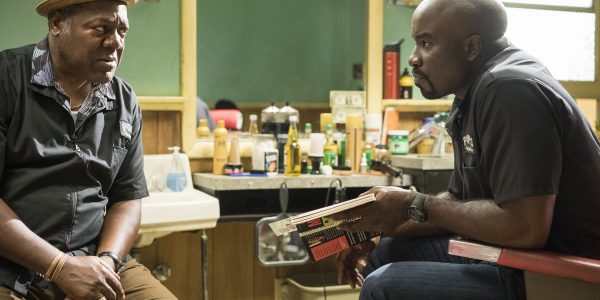 The Music
The Music
What made
Marvel's Luke Cage standout from other Netflix Marvel series, and most other crime series in general (with the exception of Fox's current hit
Empire and former 1990s hit series
New York Undercover) was the music. Each series episode in was titled after a song from the legendary Hip Hop duo Gang Starr, and story content amazingly matched the song each time. The music in the series was a very important part of the narrative, and not just background filler or something seemingly forced upon the viewer. Like many well-respected black films and television series of the past,
Luke Cage embraced black music and culture and used the music score to forward the story and make the viewers feel the emotions of the characters through acting, images, as well through song.
It was well-documented before the series that both Adrian Younge (
Black Dynamite) and Ali Shaheed Muhammad (A Tribe Called Quest, Lucy Pearl) would compose the music for
Marvel's Luke Cage. They have worked well together in the past, and their combined efforts here were top notch, with an incredible blend of 1970s Soul Music with Jazz and the best of Golden Age Hip Hop. During the course of the series several artists were seen performing at Harlem's Paradise night club, including Raphael Saadiq, Faith Evans, Charles Bradley, Jidenna, The Delfonics, and Sharon Jones & the Dap-Kings. These performances made up a significant part of the early episodes and helped the viewer feel like they too were a part of the Harlem scene.The soundtrack to the series is now also available for purchase, and I would highly recommend it as well as a companion piece to the series.
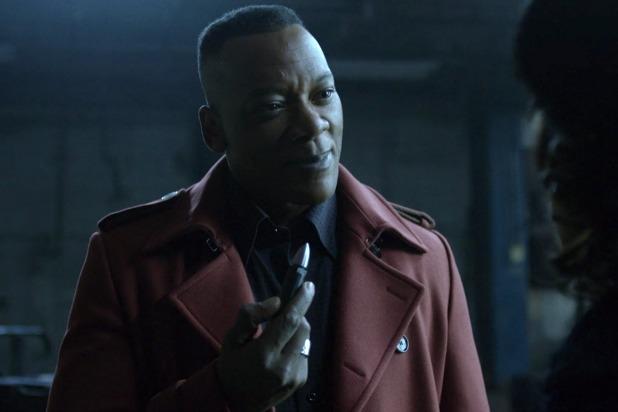 The Story
The Story
The story of the first season was also a cut above, and was definitely one of the high points. The way the story unfolded definitely compared favorably to the first seasons of
Daredevil and
Jessica Jones, which is high praise. I greatly appreciated the early action scenes and getting right into the story instead of forcing an early origin. I would have liked to see more connection though between
Luke Cage at the end of
Jessica Jones. There were some mentions and references, but there were also still many holes left to fill in my view. For instance, what happened to the Hell's Kitchen bar? Where did the money come from to pay for it and his motorcycle from
Jessica Jones in the first place?
Beyond those things, the parallel character development through story flashbacks for Luke Cage, Cottonmouth, Mariah, and Diamondback provided great details on the characters, but were done in a way to not slow down the story. The inclusion of Turk Barrett and the assistant district attorney Blake Tower from
Daredevil were great, as was the
Iron Man 2 connection with Hammer Industries - nicely done. Will Luke Cage be the only Marvel hero to face the lethal Judas Bullets? We'll have to wait and see.
Along with the great story and Marvel Easter eggs, there were many African-American history and popular culture references in addition to social commentary that were important parts of the series and made the connections between
Luke Cage and Harlem more rich and authentic. Notable real life figures like Dapper Dan, Method Man, and Fab Five Freddy made appearances during the series, as did several famous Harlem landmarks like the Apollo Theater, Rucker Park, and Mt. Olivet Baptist Church. Luke Cage was portrayed as an avid reader in the series, being seen with and knowledgeable on and about the works of Ralph Ellison, Donald Goines, and Chester Himes to name a few. A person viewing this series will not only see a great crime series, but will also be exposed to culture, history, and some of the best writing of the 20th Century.
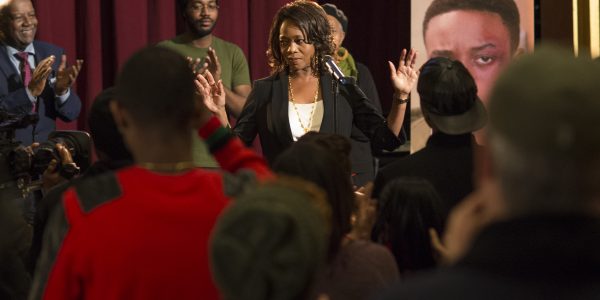 The Characters
The Characters
The best parts of
Marvel's Luke Cage were the characters and the acting. The characters drew you into their lives, and with each episode you felt you could see the action in the series unfolding from all of their different perspectives. Each actor, Mike Colter as Luke, Simone Missick as Misty Knight, Mahershala Ali as Cottonmouth Stokes, Alfre Woodard as Mariah Dillard, Theo Rossi as Shades Alvarez, Rosario Dawson as Claire Temple, and Erik Laray Harvey as Diamondback, was excellent in their portrayal. I would fully expect several of these actors to win awards for their work in this series during award season - especially Alfre Woodard. Her version of the comic book character Black Mariah was very complex, and one for the ages.
All of these main characters, like Black Mariah, were based on the comic book source material, but modernized for the 21st Century and a television audience. Throughout the series you were able to see the growth and development of Luke Cage as a hero, the internal struggles of both Cottomouth and Mariah Dillard to fight against their family past and potential true natures, and observe Claire Temple continue her journey as the connecting piece between all the Netflix Marvel series. Perhaps most impressive of all was the tensions and final conflict of almost Biblical proportions between estranged half-brothers Luke Cage and Diamondback at the end of the series. The character development led to an intense buildup and a mostly satisfying conclusion.
None of the main characters in
Luke Cage appeared to overblown or outlandish, which can sometimes happen when adapting comics to television or film. Instead, they seemed very realistic, with multiple facets, and behaviors and personalities that are believable and realistic for today's complex world. In fact, I would argue it was even possible to see yourselves in the places of series villains Cottonmouth, Black Mariah, or Diamondback. They each had tragic upbringings, which directly led to their lives of crime. The viewer is left to question how different would their lives have been, under similar circumstances. They were not "the other," but could have potentially been you.
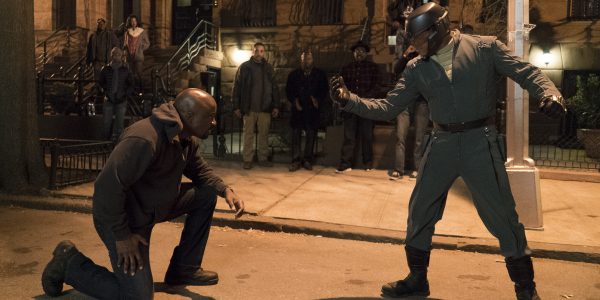
The most over the top character was that of Diamondback, brilliantly portrayed by Erik Laray Harvey. In this case, the actor portrayal definitely fit the character and the story, and was truly appropriate and should not have been done any other way. The abandoned bastard "son of a preacher man" who grows up to become a mentally deranged serial killer and supervillain? Outstanding storytelling in
Luke Cage, with an excellent portrayal by Harvey.
Still Room For Improvement
Though
Marvel's Luke Cage was a very good Netflix offering, there were still some problems. There was definitely a clear difference between the first six episodes of the series, and the next five or so. It seemed things started to slow significantly about halfway through the season, which has become a problem with many Netflix series in my view. It is almost as if the creators are trying to stretch the story to fit 13 episodes. Despite the noticeable lull, the series picked back up during the concluding episodes, which more than made up for what some may have considered filler for an episode or two.
I was also not a big fan of Diamondback's costume or its reveal during his final "boss battle" with Luke Cage in the last two episodes. The whole thing seemed a bit over the top, which was even used to comedic effect by the character Bobby Fish (Ron Cephas Jones) during the climatic final fight scene. The suit was truly a "villain costume" and didn't seem to fit in with the show based on all the previous episodes, though I can understand and respect the obvious homage to the original Diamondback costume from the 1970s. I was reminded of another over the top character - the villain Sho'nuff the Shogun of Harlem from
Berry Gordy's Last Dragon, another African-American film classic. Perhaps this was an intentional homage, but either way, Diamondback was a great character and this was a minor complaint from an exceptional series.
The Verdict
Marvel's Luke Cage earned a 9.5 from me, and was the best Netflix Marvel show - the best Marvel show overall - of any I have seen yet, and I have seen them all. The show was action-packed, well-done and well made with clear intentionality. Showrunner Cheo Hodari Coker has laid a solid blueprint for future Netflix Marvel series and for future superhero treatments of characters of color by DC, Marvel, or any other company. It is clear all involved took this project very seriously, knew there were many eyes on them with high expectations, and proceeded to score a massive success. Congratulations to all involved, and I'm looking forward to the second season.
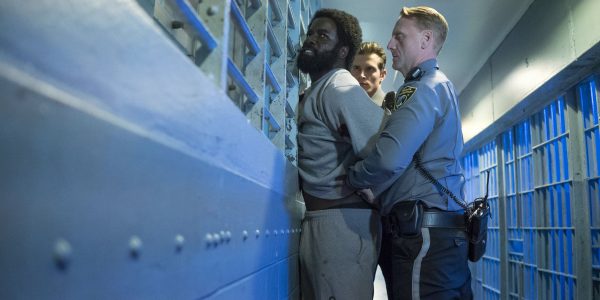
The One Episode You Have to See
"Step in the Arena," aka the prison episode - well written, directed, and acted. It was like watching
Jamaa Fanaka's original Penitentiary movie, the HBO series
Oz, or Sylvester Stallone in
Lock Up
all rolled into one. If you have to do an origin story, do it like this.
My Favorite Character from Marvel's Luke Cage
Inmate Reggie aka Squabbles from "Step in the Arena," portrayed by Craig 'muMs da Schemer' Grant. He was a good friend and mentor of Luke Cage while he was in Seagate Prison, but unfortunately it didn't end well for him. Too bad, I was hoping to see more of the character.
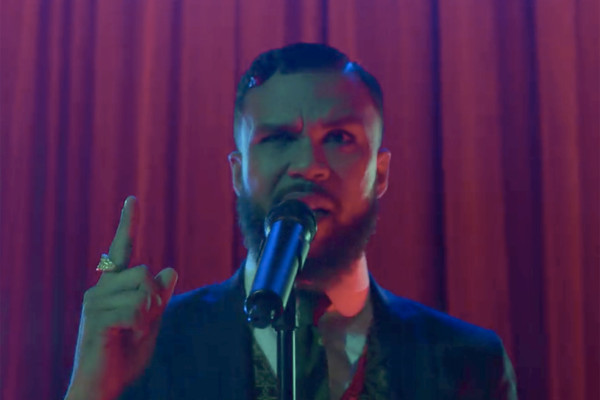 My Favorite Performance from Harlem's Paradise
My Favorite Performance from Harlem's Paradise
Jidenna performed "Long Live the Chief" in the fifth episode "Just to Get a Rep." It was a powerful performance and totally meshed with the emotions, mood, and tone of the episode.
Some Unanswered Questions From Marvel's Luke Cage
Inquiring mind what to know! What's next for Diamondback? Will he reappear in a future season of
Marvel's Luke Cage?
How will Claire Temple fit into
Iron Fist?
What happened to Shades? Have we seen the last of him? I hope not, Theo Rossi gave an inspired performance.
Where is Luke's father, the good Reverend James Lucas?
Will Misty Knight receive her bionic arm in the MCU? She sustained an arm injury on the show, but seemed to heal. Was that the only reference to the comics, or will that injury be revisited?
Who will the "big bad" be for the next season? Will there be any other new heroes of villains from the comics? See my earlier article for my
wishlist of villains on future seasons of
Luke Cage. The possibilities are almost endless.
Pros
- Exceptional Music Score
- Interesting and Timely Story
- Mostly True to Source Material
- Notable Social Commentary
- Visual Connections to Harlem and African-American Culture
- Strong Character Development
Cons
- Needed More Direct Connection to Jessica Jones
- Drags a Bit Towards the Middle of the Series
- Diamondback "Costume" A Bit Over the Top
 With Jessica Jones and Daredevil already on Netflix, Agents of S.H.I.E.L.D. and Agent Carter already having aired on ABC, and with all the highly successful MCU films over the past decade, the competition was stiff and the comparisons were imminent. Not only did Luke Cage live up to the expectations and hype in my view - the series surpassed them.
Marvel's Luke Cage is the best Marvel television series to date - it is not even close. If you haven't seen this show yet, do it now - you won't be disappointed. The best one-sentence description I can give you is that it is an exciting and audacious mix of the past, the present, and the future of black storytelling. It is an exciting stew of things many fans have been waiting to see for a long time. Parts Superfly, Shaft, and Dolemite from the 1970s, New Jack City and Boyz n the Hood from the 1990s, The Wire from the 2000s, and the best parts of every outstanding gangster film you have ever guiltily enjoyed in your life, combined with a liberal dash of social commentary, African-American history, and a whole shovel full of unapologetic blackness.
With Jessica Jones and Daredevil already on Netflix, Agents of S.H.I.E.L.D. and Agent Carter already having aired on ABC, and with all the highly successful MCU films over the past decade, the competition was stiff and the comparisons were imminent. Not only did Luke Cage live up to the expectations and hype in my view - the series surpassed them.
Marvel's Luke Cage is the best Marvel television series to date - it is not even close. If you haven't seen this show yet, do it now - you won't be disappointed. The best one-sentence description I can give you is that it is an exciting and audacious mix of the past, the present, and the future of black storytelling. It is an exciting stew of things many fans have been waiting to see for a long time. Parts Superfly, Shaft, and Dolemite from the 1970s, New Jack City and Boyz n the Hood from the 1990s, The Wire from the 2000s, and the best parts of every outstanding gangster film you have ever guiltily enjoyed in your life, combined with a liberal dash of social commentary, African-American history, and a whole shovel full of unapologetic blackness.
 The Music
What made Marvel's Luke Cage standout from other Netflix Marvel series, and most other crime series in general (with the exception of Fox's current hit Empire and former 1990s hit series New York Undercover) was the music. Each series episode in was titled after a song from the legendary Hip Hop duo Gang Starr, and story content amazingly matched the song each time. The music in the series was a very important part of the narrative, and not just background filler or something seemingly forced upon the viewer. Like many well-respected black films and television series of the past, Luke Cage embraced black music and culture and used the music score to forward the story and make the viewers feel the emotions of the characters through acting, images, as well through song.
It was well-documented before the series that both Adrian Younge (Black Dynamite) and Ali Shaheed Muhammad (A Tribe Called Quest, Lucy Pearl) would compose the music for Marvel's Luke Cage. They have worked well together in the past, and their combined efforts here were top notch, with an incredible blend of 1970s Soul Music with Jazz and the best of Golden Age Hip Hop. During the course of the series several artists were seen performing at Harlem's Paradise night club, including Raphael Saadiq, Faith Evans, Charles Bradley, Jidenna, The Delfonics, and Sharon Jones & the Dap-Kings. These performances made up a significant part of the early episodes and helped the viewer feel like they too were a part of the Harlem scene.The soundtrack to the series is now also available for purchase, and I would highly recommend it as well as a companion piece to the series.
The Music
What made Marvel's Luke Cage standout from other Netflix Marvel series, and most other crime series in general (with the exception of Fox's current hit Empire and former 1990s hit series New York Undercover) was the music. Each series episode in was titled after a song from the legendary Hip Hop duo Gang Starr, and story content amazingly matched the song each time. The music in the series was a very important part of the narrative, and not just background filler or something seemingly forced upon the viewer. Like many well-respected black films and television series of the past, Luke Cage embraced black music and culture and used the music score to forward the story and make the viewers feel the emotions of the characters through acting, images, as well through song.
It was well-documented before the series that both Adrian Younge (Black Dynamite) and Ali Shaheed Muhammad (A Tribe Called Quest, Lucy Pearl) would compose the music for Marvel's Luke Cage. They have worked well together in the past, and their combined efforts here were top notch, with an incredible blend of 1970s Soul Music with Jazz and the best of Golden Age Hip Hop. During the course of the series several artists were seen performing at Harlem's Paradise night club, including Raphael Saadiq, Faith Evans, Charles Bradley, Jidenna, The Delfonics, and Sharon Jones & the Dap-Kings. These performances made up a significant part of the early episodes and helped the viewer feel like they too were a part of the Harlem scene.The soundtrack to the series is now also available for purchase, and I would highly recommend it as well as a companion piece to the series.
 The Story
The story of the first season was also a cut above, and was definitely one of the high points. The way the story unfolded definitely compared favorably to the first seasons of Daredevil and Jessica Jones, which is high praise. I greatly appreciated the early action scenes and getting right into the story instead of forcing an early origin. I would have liked to see more connection though between Luke Cage at the end of Jessica Jones. There were some mentions and references, but there were also still many holes left to fill in my view. For instance, what happened to the Hell's Kitchen bar? Where did the money come from to pay for it and his motorcycle from Jessica Jones in the first place?
Beyond those things, the parallel character development through story flashbacks for Luke Cage, Cottonmouth, Mariah, and Diamondback provided great details on the characters, but were done in a way to not slow down the story. The inclusion of Turk Barrett and the assistant district attorney Blake Tower from Daredevil were great, as was the Iron Man 2 connection with Hammer Industries - nicely done. Will Luke Cage be the only Marvel hero to face the lethal Judas Bullets? We'll have to wait and see.
Along with the great story and Marvel Easter eggs, there were many African-American history and popular culture references in addition to social commentary that were important parts of the series and made the connections between Luke Cage and Harlem more rich and authentic. Notable real life figures like Dapper Dan, Method Man, and Fab Five Freddy made appearances during the series, as did several famous Harlem landmarks like the Apollo Theater, Rucker Park, and Mt. Olivet Baptist Church. Luke Cage was portrayed as an avid reader in the series, being seen with and knowledgeable on and about the works of Ralph Ellison, Donald Goines, and Chester Himes to name a few. A person viewing this series will not only see a great crime series, but will also be exposed to culture, history, and some of the best writing of the 20th Century.
The Story
The story of the first season was also a cut above, and was definitely one of the high points. The way the story unfolded definitely compared favorably to the first seasons of Daredevil and Jessica Jones, which is high praise. I greatly appreciated the early action scenes and getting right into the story instead of forcing an early origin. I would have liked to see more connection though between Luke Cage at the end of Jessica Jones. There were some mentions and references, but there were also still many holes left to fill in my view. For instance, what happened to the Hell's Kitchen bar? Where did the money come from to pay for it and his motorcycle from Jessica Jones in the first place?
Beyond those things, the parallel character development through story flashbacks for Luke Cage, Cottonmouth, Mariah, and Diamondback provided great details on the characters, but were done in a way to not slow down the story. The inclusion of Turk Barrett and the assistant district attorney Blake Tower from Daredevil were great, as was the Iron Man 2 connection with Hammer Industries - nicely done. Will Luke Cage be the only Marvel hero to face the lethal Judas Bullets? We'll have to wait and see.
Along with the great story and Marvel Easter eggs, there were many African-American history and popular culture references in addition to social commentary that were important parts of the series and made the connections between Luke Cage and Harlem more rich and authentic. Notable real life figures like Dapper Dan, Method Man, and Fab Five Freddy made appearances during the series, as did several famous Harlem landmarks like the Apollo Theater, Rucker Park, and Mt. Olivet Baptist Church. Luke Cage was portrayed as an avid reader in the series, being seen with and knowledgeable on and about the works of Ralph Ellison, Donald Goines, and Chester Himes to name a few. A person viewing this series will not only see a great crime series, but will also be exposed to culture, history, and some of the best writing of the 20th Century.
 The Characters
The best parts of Marvel's Luke Cage were the characters and the acting. The characters drew you into their lives, and with each episode you felt you could see the action in the series unfolding from all of their different perspectives. Each actor, Mike Colter as Luke, Simone Missick as Misty Knight, Mahershala Ali as Cottonmouth Stokes, Alfre Woodard as Mariah Dillard, Theo Rossi as Shades Alvarez, Rosario Dawson as Claire Temple, and Erik Laray Harvey as Diamondback, was excellent in their portrayal. I would fully expect several of these actors to win awards for their work in this series during award season - especially Alfre Woodard. Her version of the comic book character Black Mariah was very complex, and one for the ages.
All of these main characters, like Black Mariah, were based on the comic book source material, but modernized for the 21st Century and a television audience. Throughout the series you were able to see the growth and development of Luke Cage as a hero, the internal struggles of both Cottomouth and Mariah Dillard to fight against their family past and potential true natures, and observe Claire Temple continue her journey as the connecting piece between all the Netflix Marvel series. Perhaps most impressive of all was the tensions and final conflict of almost Biblical proportions between estranged half-brothers Luke Cage and Diamondback at the end of the series. The character development led to an intense buildup and a mostly satisfying conclusion.
None of the main characters in Luke Cage appeared to overblown or outlandish, which can sometimes happen when adapting comics to television or film. Instead, they seemed very realistic, with multiple facets, and behaviors and personalities that are believable and realistic for today's complex world. In fact, I would argue it was even possible to see yourselves in the places of series villains Cottonmouth, Black Mariah, or Diamondback. They each had tragic upbringings, which directly led to their lives of crime. The viewer is left to question how different would their lives have been, under similar circumstances. They were not "the other," but could have potentially been you.
The Characters
The best parts of Marvel's Luke Cage were the characters and the acting. The characters drew you into their lives, and with each episode you felt you could see the action in the series unfolding from all of their different perspectives. Each actor, Mike Colter as Luke, Simone Missick as Misty Knight, Mahershala Ali as Cottonmouth Stokes, Alfre Woodard as Mariah Dillard, Theo Rossi as Shades Alvarez, Rosario Dawson as Claire Temple, and Erik Laray Harvey as Diamondback, was excellent in their portrayal. I would fully expect several of these actors to win awards for their work in this series during award season - especially Alfre Woodard. Her version of the comic book character Black Mariah was very complex, and one for the ages.
All of these main characters, like Black Mariah, were based on the comic book source material, but modernized for the 21st Century and a television audience. Throughout the series you were able to see the growth and development of Luke Cage as a hero, the internal struggles of both Cottomouth and Mariah Dillard to fight against their family past and potential true natures, and observe Claire Temple continue her journey as the connecting piece between all the Netflix Marvel series. Perhaps most impressive of all was the tensions and final conflict of almost Biblical proportions between estranged half-brothers Luke Cage and Diamondback at the end of the series. The character development led to an intense buildup and a mostly satisfying conclusion.
None of the main characters in Luke Cage appeared to overblown or outlandish, which can sometimes happen when adapting comics to television or film. Instead, they seemed very realistic, with multiple facets, and behaviors and personalities that are believable and realistic for today's complex world. In fact, I would argue it was even possible to see yourselves in the places of series villains Cottonmouth, Black Mariah, or Diamondback. They each had tragic upbringings, which directly led to their lives of crime. The viewer is left to question how different would their lives have been, under similar circumstances. They were not "the other," but could have potentially been you.
 The most over the top character was that of Diamondback, brilliantly portrayed by Erik Laray Harvey. In this case, the actor portrayal definitely fit the character and the story, and was truly appropriate and should not have been done any other way. The abandoned bastard "son of a preacher man" who grows up to become a mentally deranged serial killer and supervillain? Outstanding storytelling in Luke Cage, with an excellent portrayal by Harvey.
Still Room For Improvement
Though Marvel's Luke Cage was a very good Netflix offering, there were still some problems. There was definitely a clear difference between the first six episodes of the series, and the next five or so. It seemed things started to slow significantly about halfway through the season, which has become a problem with many Netflix series in my view. It is almost as if the creators are trying to stretch the story to fit 13 episodes. Despite the noticeable lull, the series picked back up during the concluding episodes, which more than made up for what some may have considered filler for an episode or two.
I was also not a big fan of Diamondback's costume or its reveal during his final "boss battle" with Luke Cage in the last two episodes. The whole thing seemed a bit over the top, which was even used to comedic effect by the character Bobby Fish (Ron Cephas Jones) during the climatic final fight scene. The suit was truly a "villain costume" and didn't seem to fit in with the show based on all the previous episodes, though I can understand and respect the obvious homage to the original Diamondback costume from the 1970s. I was reminded of another over the top character - the villain Sho'nuff the Shogun of Harlem from Berry Gordy's Last Dragon, another African-American film classic. Perhaps this was an intentional homage, but either way, Diamondback was a great character and this was a minor complaint from an exceptional series.
The Verdict
Marvel's Luke Cage earned a 9.5 from me, and was the best Netflix Marvel show - the best Marvel show overall - of any I have seen yet, and I have seen them all. The show was action-packed, well-done and well made with clear intentionality. Showrunner Cheo Hodari Coker has laid a solid blueprint for future Netflix Marvel series and for future superhero treatments of characters of color by DC, Marvel, or any other company. It is clear all involved took this project very seriously, knew there were many eyes on them with high expectations, and proceeded to score a massive success. Congratulations to all involved, and I'm looking forward to the second season.
The One Episode You Have to See
"Step in the Arena," aka the prison episode - well written, directed, and acted. It was like watching Jamaa Fanaka's original Penitentiary movie, the HBO series Oz, or Sylvester Stallone in Lock Up
all rolled into one. If you have to do an origin story, do it like this.
My Favorite Character from Marvel's Luke Cage
Inmate Reggie aka Squabbles from "Step in the Arena," portrayed by Craig 'muMs da Schemer' Grant. He was a good friend and mentor of Luke Cage while he was in Seagate Prison, but unfortunately it didn't end well for him. Too bad, I was hoping to see more of the character.
The most over the top character was that of Diamondback, brilliantly portrayed by Erik Laray Harvey. In this case, the actor portrayal definitely fit the character and the story, and was truly appropriate and should not have been done any other way. The abandoned bastard "son of a preacher man" who grows up to become a mentally deranged serial killer and supervillain? Outstanding storytelling in Luke Cage, with an excellent portrayal by Harvey.
Still Room For Improvement
Though Marvel's Luke Cage was a very good Netflix offering, there were still some problems. There was definitely a clear difference between the first six episodes of the series, and the next five or so. It seemed things started to slow significantly about halfway through the season, which has become a problem with many Netflix series in my view. It is almost as if the creators are trying to stretch the story to fit 13 episodes. Despite the noticeable lull, the series picked back up during the concluding episodes, which more than made up for what some may have considered filler for an episode or two.
I was also not a big fan of Diamondback's costume or its reveal during his final "boss battle" with Luke Cage in the last two episodes. The whole thing seemed a bit over the top, which was even used to comedic effect by the character Bobby Fish (Ron Cephas Jones) during the climatic final fight scene. The suit was truly a "villain costume" and didn't seem to fit in with the show based on all the previous episodes, though I can understand and respect the obvious homage to the original Diamondback costume from the 1970s. I was reminded of another over the top character - the villain Sho'nuff the Shogun of Harlem from Berry Gordy's Last Dragon, another African-American film classic. Perhaps this was an intentional homage, but either way, Diamondback was a great character and this was a minor complaint from an exceptional series.
The Verdict
Marvel's Luke Cage earned a 9.5 from me, and was the best Netflix Marvel show - the best Marvel show overall - of any I have seen yet, and I have seen them all. The show was action-packed, well-done and well made with clear intentionality. Showrunner Cheo Hodari Coker has laid a solid blueprint for future Netflix Marvel series and for future superhero treatments of characters of color by DC, Marvel, or any other company. It is clear all involved took this project very seriously, knew there were many eyes on them with high expectations, and proceeded to score a massive success. Congratulations to all involved, and I'm looking forward to the second season.
The One Episode You Have to See
"Step in the Arena," aka the prison episode - well written, directed, and acted. It was like watching Jamaa Fanaka's original Penitentiary movie, the HBO series Oz, or Sylvester Stallone in Lock Up
all rolled into one. If you have to do an origin story, do it like this.
My Favorite Character from Marvel's Luke Cage
Inmate Reggie aka Squabbles from "Step in the Arena," portrayed by Craig 'muMs da Schemer' Grant. He was a good friend and mentor of Luke Cage while he was in Seagate Prison, but unfortunately it didn't end well for him. Too bad, I was hoping to see more of the character.
 My Favorite Performance from Harlem's Paradise
Jidenna performed "Long Live the Chief" in the fifth episode "Just to Get a Rep." It was a powerful performance and totally meshed with the emotions, mood, and tone of the episode.
Some Unanswered Questions From Marvel's Luke Cage
Inquiring mind what to know! What's next for Diamondback? Will he reappear in a future season of Marvel's Luke Cage?
How will Claire Temple fit into Iron Fist?
What happened to Shades? Have we seen the last of him? I hope not, Theo Rossi gave an inspired performance.
Where is Luke's father, the good Reverend James Lucas?
Will Misty Knight receive her bionic arm in the MCU? She sustained an arm injury on the show, but seemed to heal. Was that the only reference to the comics, or will that injury be revisited?
Who will the "big bad" be for the next season? Will there be any other new heroes of villains from the comics? See my earlier article for my wishlist of villains on future seasons of Luke Cage. The possibilities are almost endless.
My Favorite Performance from Harlem's Paradise
Jidenna performed "Long Live the Chief" in the fifth episode "Just to Get a Rep." It was a powerful performance and totally meshed with the emotions, mood, and tone of the episode.
Some Unanswered Questions From Marvel's Luke Cage
Inquiring mind what to know! What's next for Diamondback? Will he reappear in a future season of Marvel's Luke Cage?
How will Claire Temple fit into Iron Fist?
What happened to Shades? Have we seen the last of him? I hope not, Theo Rossi gave an inspired performance.
Where is Luke's father, the good Reverend James Lucas?
Will Misty Knight receive her bionic arm in the MCU? She sustained an arm injury on the show, but seemed to heal. Was that the only reference to the comics, or will that injury be revisited?
Who will the "big bad" be for the next season? Will there be any other new heroes of villains from the comics? See my earlier article for my wishlist of villains on future seasons of Luke Cage. The possibilities are almost endless.